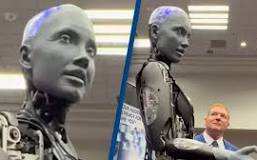Understanding General AI: The Future of Artificial Intelligence
Artificial Intelligence (AI) has become a buzzword in today’s technological landscape, with applications ranging from simple automation to complex problem-solving. While most current AI systems are designed for specific tasks, the concept of General AI, or Artificial General Intelligence (AGI), represents a significant leap forward. This article explores what General AI is, its potential implications, and the challenges it presents.
What Is General AI?
General AI refers to a type of artificial intelligence that possesses the ability to understand, learn, and apply knowledge across a wide range of tasks at a level comparable to human intelligence. Unlike narrow AI, which is designed for specific functions such as language translation or facial recognition, General AI aims to perform any intellectual task that a human can do.
The Potential of General AI
The development of General AI could revolutionize various industries by offering unprecedented levels of efficiency and innovation. Here are some potential benefits:
- Healthcare: With advanced diagnostic capabilities and personalized treatment plans, General AI could transform patient care and medical research.
- Education: Intelligent tutoring systems could provide customized learning experiences tailored to individual student needs.
- Transportation: Autonomous vehicles powered by General AI could improve traffic management and reduce accidents.
Challenges in Developing General AI
The path to achieving General AI is fraught with challenges. Some key obstacles include:
- Technical Complexity: Creating an AI system that can mimic human cognitive abilities requires advances in machine learning algorithms, computational power, and data processing techniques.
- Ethical Concerns: The deployment of autonomous systems raises questions about privacy, security, and decision-making accountability.
- Sociopolitical Impact: The widespread adoption of General AI could disrupt labor markets and necessitate new policies on employment and education.
The Road Ahead
The journey toward developing General AI is still in its early stages. Researchers are exploring various approaches such as neural networks that mimic the human brain’s structure or hybrid models combining symbolic reasoning with machine learning. Collaboration among academia, industry leaders, and policymakers will be crucial in addressing the technical and ethical challenges involved.
Conclusion
General AI holds the promise of transforming society by enhancing our capabilities beyond current limits. However, realizing this potential requires careful consideration of both technological hurdles and ethical implications. As we continue to explore this frontier, it is essential to foster an informed dialogue about how best to integrate these advancements into our world responsibly.
Unlocking the Future: 6 Advantages of General AI in Modern Society
Challenges of General AI: Ethical Misuse, Job Displacement, Safety Concerns, and Socioeconomic Inequality
- Ethical concerns regarding the potential misuse of General AI for malicious purposes.
- Risk of job displacement as automation powered by General AI may replace human workers in various industries.
- Complexity in ensuring the safety and security of General AI systems to prevent unintended consequences or errors.
- Unequal access to General AI technology, which could widen existing socioeconomic disparities and create a digital divide.
1. Versatility
One of the most significant advantages of General AI is its versatility, which allows it to adapt to a wide range of tasks and offer unparalleled flexibility in problem-solving. Unlike narrow AI systems designed for specific functions, General AI has the potential to understand and perform various activities across different domains with human-like proficiency. This adaptability means it can seamlessly switch between tasks such as language translation, data analysis, and even creative endeavors like composing music or writing articles. As a result, General AI can significantly enhance productivity and innovation in numerous fields by providing tailored solutions that meet diverse needs and challenges.
2. Efficiency
One of the significant advantages of General AI is its ability to enhance efficiency through superior cognitive processing. Unlike humans, General AI can analyze vast amounts of data at incredible speeds, ensuring rapid and precise decision-making. This capability allows for the optimization of complex processes across various industries, from streamlining supply chain logistics to improving financial forecasting. By reducing the time and effort required to process information, General AI not only increases productivity but also minimizes errors that could arise from human fatigue or oversight. As a result, organizations can achieve greater operational efficiency and allocate human resources to more strategic tasks that require creativity and emotional intelligence.
3. Innovation
The innovation potential of General AI lies in its ability to emulate human-like creativity and learning capabilities, which can drive groundbreaking discoveries and solutions across various fields. By processing vast amounts of data and identifying patterns beyond human capacity, General AI can generate novel ideas and approaches to complex problems. This could lead to significant advancements in areas such as scientific research, where AI might uncover new theories or accelerate the development of technologies previously thought impossible. Additionally, in industries like design and engineering, General AI could offer innovative solutions that enhance product development and optimize processes, ultimately fostering a new era of technological progress.
4. Personalization
General AI has the potential to revolutionize personalization by delivering highly customized experiences that cater to individual preferences and needs. Unlike narrow AI systems, which are limited to specific tasks, General AI can analyze vast amounts of data from various sources to understand a person’s unique behaviors, interests, and requirements. This capability allows it to offer personalized recommendations in diverse areas such as entertainment, shopping, and healthcare. For instance, in the realm of education, General AI could create tailored learning plans that adapt in real-time to a student’s progress and learning style, enhancing their educational experience. In healthcare, it could provide personalized treatment options based on a comprehensive analysis of an individual’s medical history and lifestyle. By understanding and anticipating user needs on a deeper level, General AI promises to enhance satisfaction and efficiency across multiple facets of daily life.
5. Automation
General AI has the potential to revolutionize automation by taking over tasks that are repetitive or hazardous for humans, thereby enhancing efficiency and safety in various industries. For instance, in manufacturing, General AI systems can manage assembly lines with precision and consistency, reducing the risk of human error and injury. In sectors like mining or chemical processing, where workers are exposed to dangerous environments, AI can perform complex operations remotely, minimizing health risks. By automating these tasks, General AI not only increases productivity but also allows human workers to focus on more creative and strategic roles that require critical thinking and problem-solving skills. This shift could lead to safer workplaces and a more innovative economy.
6. Decision-Making
One of the significant advantages of General AI is its ability to enhance decision-making processes by analyzing complex data sets with remarkable efficiency and accuracy. Unlike humans, who may struggle with processing vast amounts of information, General AI can quickly identify patterns and extract meaningful insights from large data volumes. This capability allows it to make informed decisions that are not only data-driven but also free from emotional bias. In fields such as finance, healthcare, and logistics, this means more accurate predictions, optimized strategies, and improved outcomes. By leveraging its advanced analytical abilities, General AI has the potential to transform how decisions are made across various industries, leading to increased productivity and innovation.
Ethical concerns regarding the potential misuse of General AI for malicious purposes.
The development of General AI brings with it significant ethical concerns, particularly regarding its potential misuse for malicious purposes. As AI systems become more sophisticated and autonomous, there is a risk that they could be exploited by individuals or groups with harmful intentions. This could include the creation of autonomous weapons, surveillance systems that infringe on privacy rights, or AI-driven misinformation campaigns. The ability of General AI to operate independently and make decisions without human intervention raises questions about accountability and control. Ensuring that safeguards are in place to prevent such misuse is crucial, requiring collaboration between technologists, ethicists, and policymakers to establish guidelines and regulations that prioritize safety and ethical considerations.
Risk of job displacement as automation powered by General AI may replace human workers in various industries.
The advent of General AI poses a significant risk of job displacement across numerous industries as automation becomes more sophisticated and capable of performing tasks traditionally carried out by humans. With the ability to learn and adapt across a wide range of functions, General AI systems could potentially replace jobs in sectors such as manufacturing, transportation, customer service, and even more complex fields like healthcare and finance. This shift could lead to widespread unemployment and economic disruption if not managed carefully. It underscores the need for proactive measures, such as reskilling programs and policy interventions, to ensure that workers can transition into new roles in an evolving job market. Balancing technological advancement with social responsibility will be crucial in mitigating the negative impacts of this transition.
Complexity in ensuring the safety and security of General AI systems to prevent unintended consequences or errors.
Ensuring the safety and security of General AI systems is a complex challenge that cannot be overstated. As these systems are designed to operate autonomously across a wide range of tasks, any unintended consequences or errors could have far-reaching implications. The complexity arises from the need to predict and control AI behavior in unpredictable environments, which requires sophisticated algorithms and robust testing protocols. Moreover, as General AI systems become more integrated into critical infrastructure, the risk of malicious attacks or system failures increases, necessitating advanced security measures. Ensuring these systems act safely and align with human values demands ongoing research and collaboration among experts in AI development, cybersecurity, and ethics.
Unequal access to General AI technology, which could widen existing socioeconomic disparities and create a digital divide.
The development and deployment of General AI technology have the potential to significantly widen existing socioeconomic disparities, leading to an increased digital divide. As advanced AI systems become integral to various aspects of life, from healthcare and education to employment and governance, unequal access to these technologies could exacerbate inequalities. Wealthier individuals and countries with greater resources may benefit from enhanced productivity and innovation, while underprivileged communities could be left behind, lacking the infrastructure or means to harness these advancements. This disparity could result in a world where only a select few reap the benefits of General AI, further entrenching existing social and economic divides and posing challenges for global equity and inclusivity.



